bureading学案
7BU2Reading教案、学案

Teaching design教学流程设计:Students’sheetClass___________Name___________Num.___________Reading France is callingI.Warming upHow much do you know about France? Try the short quiz below. Circle the correct answers.1.Which is the French flag? ()a b c2 .Which is the most famous street in Paris? ()a Fifth Avenueb the Champs-Elyseesc Downing Street3.Which drink is France most famous for? ()a. teab. winec. juiceII.Pre-readingA.Phrases box:1.Western Europe 西欧2.the capital of……的首都3.places of interest 名胜4.is famous/known for 以…闻名5.on the coast 在海岸线上6.department stores 百货商店7.by the sea 在海边8.prefer(pt.preferred)prefer to do…=like doing…better 更喜欢…9.with + n. prep.有B.Fill in the blanks.1.Guangzhou _________ _________ _________ its flowers and delicious food.广州以鲜花和美食闻名。
2. I __________ ___________ ___________ at home on rainy days.下雨天我更喜欢呆在家里。
bureading学案
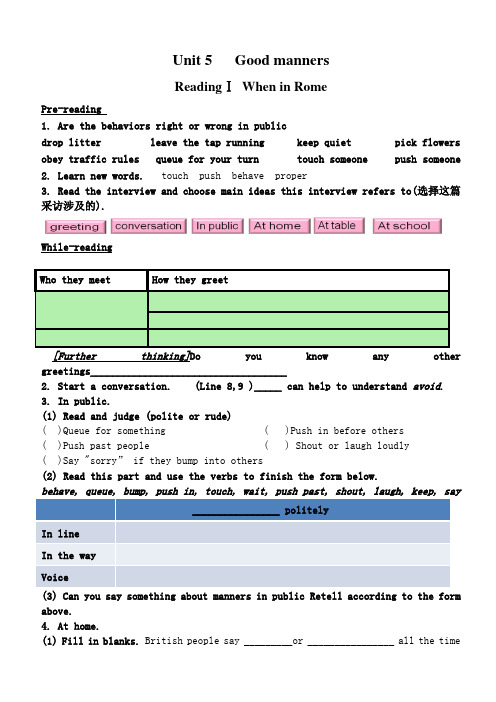
Unit 5 Good mannersReadingⅠWhen in RomePre-reading1. Are the behaviors right or wrong in publicdrop litter leave the tap running keep quiet pick flowers obey traffic rules queue for your turn touch someone push someone2. Learn new words. touch push behave proper3. Read the interview and choose main ideas this interview refers to(选择这篇采访涉及的).While-readingWho they meet How they greet[Further thinking]Do you know any other greetings____________________________________2. Start a conversation. (Line 8,9 )_____ can help to understand avoid.3. In public.(1) Read and judge (polite or rude)( )Queue for something ( )Push in before others( )Push past people ( ) Shout or laugh loudly( )Say "sorry” if they bump into others(2)Read this part and use the verbs to finish the form below.________________ politelyIn lineIn the wayVoice(3) Can you say something about manners in public Retell according to the form above.4. At home.(1) Fill in blanks. British people say _________or ________________ all the time(2) Discussion. Do we need to say “please” or “thank you” at homePost-reading1. A gameHow do you say when you meet an old friend in the street/ get help at home/ find somebody in the way/leave home for school/ask somebody to do something/meet somebody for the first time /bump into somebody _______________________________________________________________________________________________________________________________________________ _3. Discussion: Discuss about good manners in China in groups of six. The reporter writes down the ideas of the group and shares them in____________________________________________________________________________ ______Homework1. Read the interview and tell your friends manners in the UK.2. Search on the Internet to learn more about manners in different countries.3. Read the following passage and learn more about manners in different countries.Manners in different countriesYou have to shake hands when you're coming or going in Germany, but in Britain you usually only shake hands when you meet someone for the first time.You have to give your present in public in the Middle East to show it's not a bribe, but it's a good manner to give your present in private in Asia.You mustn't give cutlery in Latin America because it suggests that you want to cut off the relationship. You mustn't give food or drink in Saudi Arabia because it suggests you think your hosts aren't offering you enough to eat and drink. You mustn't give a clock in China because the Chinese word for clock is similar to the word for funeral. “Come any time” means “I want you to visit me” in India. If you don't suggest a time and arrange a visit immediately, an Indian will think you are refusing the invitation. But if an English person says “come any time”, they will think you are bad mannered if you start fixing a date.Offices are usually closed on Fridays in Moslem countries. Americans usually mean “Yes” when they nod their heads. An English person probably just means “I understand”, and an Asian is just showing interest. It's a bad manner to discuss business at a social occasion in India.In an English pub, you have to take your turn to buy a “round” drink for everyone in your group.[Questions]1. In _______, you can give your presents in private.2. When are the offices closed in Moslem countries3. Which manner do you think is most interestingCould you share it with us。
人教九年级Unit9 SectionB Reading导学案设计(无答案)
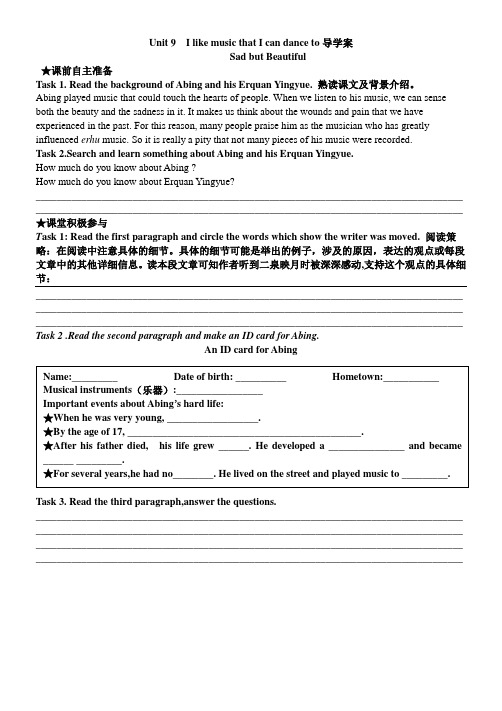
Unit 9 I like music that I can dance to导学案Sad but Beautiful★课前自主准备Task 1. Read the background of Abing and his Erquan Yingyue. 熟读课文及背景介绍。
Abing played music that could touch the hearts of people. When we listen to his music, we can sense both the beauty and the sadness in it. It makes us think about the wounds and pain that we have experienced in the past. For this reason, many people praise him as the musician who has greatly influenced erhu music. So it is really a pity that not many pieces of his music were recorded.Task 2.Search and learn something about Abing and his Erquan Yingyue.How much do you know about Abing ?How much do you know about Erquan Yingyue?____________________________________________________________________________________ ____________________________________________________________________________________★课堂积极参与T ask 1: Read the first paragraph and circle the words which show the writer was moved. 阅读策略:在阅读中注意具体的细节。
7Bunit4 Reading导学方案
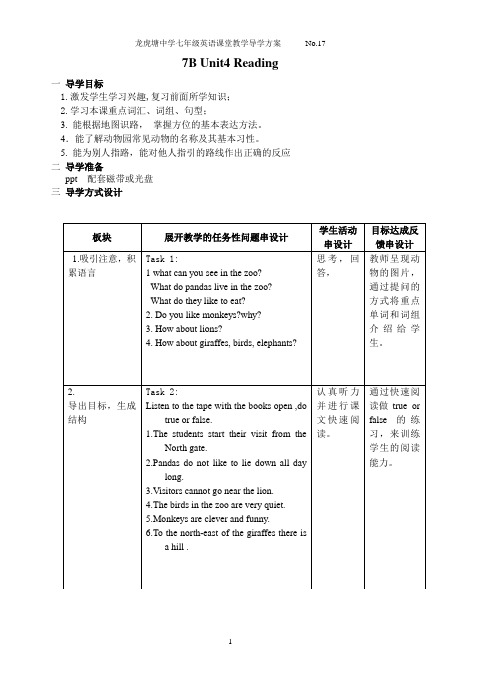
教室巡视,给予提示和帮助
5.引发期待行为,强化结构
Task 5:
Look at the map ,show the way to other people with this map.please work in pairs.
小组合作,全班展示
教室巡视,给予提示和帮助
6.
3. How about lions?
4. How about giraffes, birds, elephants?
思考,回答,
教师呈现动物的图片,通过提问的方式将重点单词和词组介绍给学生。
2.
导出目标,生成结构
Task 2:
Listen to the tape with the books open ,do true or false.
1.The students start their visit from the North gate.
2.Pandas do not like to lie down all day long.
3.Visitors annot go near the lion.
4.The birds in the zoo are very quiet.
展开教学的任务性问题串设计
学生活动串设计
目标达成反馈串设计
1.吸引注意,积累语言
Task 1:
1what can you see in the zoo?
What do pandas live in the zoo?
What do they like to eat?
2. Do you like monkeys?why?
7B Unit4Reading
7BU4 READING 1 教案新部编本

[20 – 20学年度第__学期]
任教学科:_____________
任教年级:_____________
任教老师:_____________
xx市实验学校
7B Unit4Finding your way
设计题目
7B Unit4Reading 1
教学内容
The topic of this unit is “Finding your way”.Do you know how to ask for or give directions? Can you read the map?
2.Show a picture of pandas and teach the new word: bamboo.
3.Show more pictures of other animals to teach more words and phrases. (Write on the blackboard)
Review the wordsand expressions of directions.
Let the students learn new words andimportantphrases about animals.
Let the students learn more about the animals and their features.
2.Show more pictures and organize the students to ask and answer in pairs.
1.Present pictures to tell students“We’re going to visit Sunshine Zoo today.”Then ask them to answer“What can you see in the zoo?”
M10U2Reading导学案
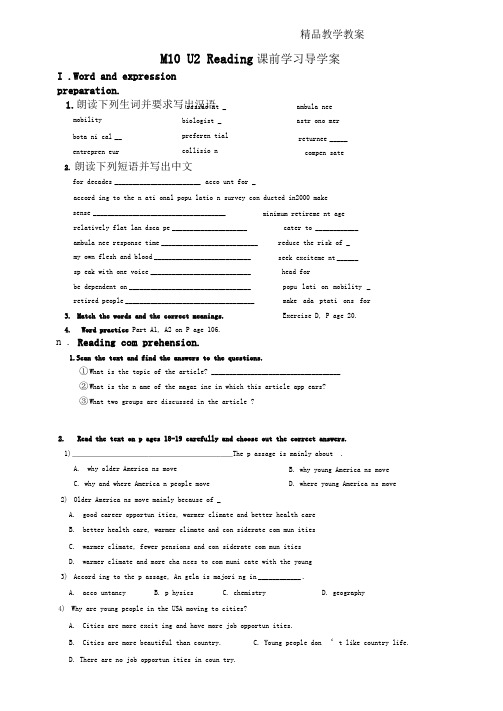
精品教学教案M10 U2 Reading 课前学习导学案2. Read the text on p ages 18-19 carefully and choose out the correct answers.1) ________________________________________The p assage is mainly about . A. why older America ns moveC. why and where America n people move 2) Older America ns move mainly because of _A. good career opportun ities, warmer climate and better health careB. better health care, warmer climate and con siderate com mun itiesC. warmer climate, fewer pensions and con siderate com mun itiesD. warmer climate and more cha nces to com muni cate with the young 3) Accord ing to the p assage, An gela is majori ng in ____________ . A. acco untancyB. p hysicsC. chemistry4) Why are young people in the USA moving to cities?A. Cities are more excit ing and have more job opportun ities.B. Cities are more beautiful than country.C. Young people don ‘ t like country life.D. There are no job opportun ities in coun try.I .Word and expression preparation.1.朗读下列生词并要求写出汉语 mobility reside nt _biologist _ preferen tial collisio nambula nee astr ono mer bota ni cal __ entrepren eur2. 朗读下列短语并写出中文for decades ________________________ acco unt for _accord ing to the n ati onal popu latio n survey con ducted in2000 make sense _____________________________________ relatively flat lan dsca pe _____________________ ambula nee response time ___________________________ my own flesh and blood ___________________________ sp eak with one voice ____________________________ be dependent on __________________________________ retired people ____________________________________ 3. Match the words and the correct meanings. 4.Word practice Part A1, A2 on P age 106.n . Reading com prehension.1.Scan the text and find the answers to the questions.① What is the topic of the article? ____________________________________ ② What is the n ame of the magaz ine in which this article app ears? ③ What two groups are discussed in the article ?returnee _____ compen sateminimum retireme nt agecater to ____________ reduce the risk of _ seek exciteme nt ______ head forpopu lati on mobility _ make ada ptati ons for Exercise D, P age 20.B. why young America ns move D. where young America ns moveD. geography5)Which of the followi ng is NOT the reas on for many people spending their later years in Florida?A. wan ti ng better health care.B. look ing for com mun ities of older peop le.C.they like the climate there.D. they can get lots of money from the gover nment.6)With the nu mber of older America ns moving to Florida, many cha nges are made to cater to them. Which of thefollow ing is not the cha nge?A.ambula nee response time has decreasedB.many houses have bathrooms desig ned for elderly homeow nersC.the com mun ities that un dersta nd the n eeds of people.D.big houses with lower p rice.3.Task-based reading.5. Part C1, C2 on P age 20.E . Consolidation Part E on Page 21.M10 U2 Reading Language Focus学习导学案I .朗读下列单词,根据要求作相应的转换mobility 中文 ________ adj. ___________ changeable 中文v. n.1.ln this editi on of America n Livi ng, we are look ing at some popu lati on trends in the USA. =In this editi onof America n Liv ing, we are _______________________________________ some popu lati on trends in the USA.2. Florida was home to the largest population of people aged 65 and older. This group accounted for nearly 18 percent of the state ' population.=Florida was _____________________________ the largest popu lati on of people aged 65 and older. This group ____________________ n early 18 percent of the state ' population.= …Nearly 18 percent of the state ' population ___________________________________ t his group. =…Nearly 18 percent of the state's population ___________________________ ____________ ___________ ___________ this group.3. That ' why moving somewhere warmer ________________________________________ (有道理; 有意义 ).4. As the nu mber of older America ns moving there in creases, more cha nges are made to_______________________ (迎合,满足)them.5. Many houses have bathrooms __________________________________ (为 …设计)elderly homeowners.6. _________________ (改进)such as these are making Florida ___________________________ __________________________________ (有更大的吸弓I 力 )older people.7. Most of the young people who ___________________________ ( 前往)big cities say the same thing: I want to __________________________ (玩得开心) 8. Th ings like walk-i n bathtubs can and falls.IV .Language points:".accountAs the manager of the bank, you must account for the missing money in the bank. Earthquakes under sea can account for tsunamis (海啸).________________________The money spent on the flat accounts for half of their in come. __________________________editi on retireme nt 中文 中文 中文v. vt. bathroomaccountant 中文 hostess p hysicist an alytical 中文 中文中文age (n. & vi.)中文 ____n .翻译下列短语或词组。
(九年级资料)U4secBreading导学案
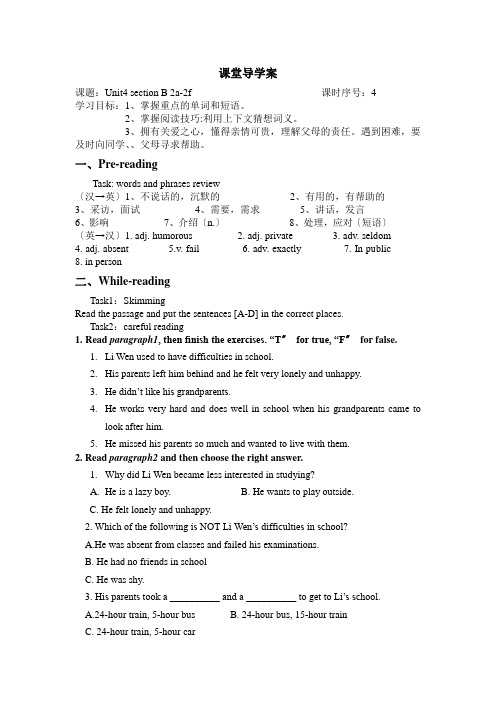
课堂导学案课题:Unit4 section B 2a-2f 课时序号:4学习目标:1、掌握重点的单词和短语。
2、掌握阅读技巧:利用上下文猜想词义。
3、拥有关爱之心,懂得亲情可贵,理解父母的责任。
遇到困难,要及时向同学、、父母寻求帮助。
一、Pre-readingTask: words and phrases review〔汉→英〕1、不说话的,沉默的______ 2、有用的,有帮助的______ 3、采访,面试______ 4、需要,需求______ 5、讲话,发言______6、影响______7、介绍〔n.〕______8、处理,应对〔短语〕______ 〔英→汉〕1. adj. humorous______ 2. adj. private______ 3. adv. seldom______ 4. adj. absent______ 5.v. fail ______ 6. adv. exactly ______ 7. In public______8. in person______二、While-readingTask1:SkimmingRead the passage and put the sentences [A-D] in the correct places.Task2:careful reading1.Read paragraph1, then finish the exercises. “T〞for true, “F〞for false.1.Li Wen used to have difficulties in school.2.His parents left him behind and he felt very lonely and unhappy.3.He didn’t like his grandparents.4.He works very hard and does well in school when his grandparents came tolook after him.5.He missed his parents so much and wanted to live with them.2.Read paragraph2 and then choose the right answer.1.Why did Li Wen became less interested in studying?A.He is a lazy boy.B. He wants to play outside.C. He felt lonely and unhappy.2. Which of the following is NOT Li Wen’s difficulties in school?A.He was absent from classes and failed his examinations.B. He had no friends in schoolC. He was shy.3. His parents took a __________ and a __________ to get to Li’s school.A.24-hour train, 5-hour busB. 24-hour bus, 15-hour trainC. 24-hour train, 5-hour carMatch the words or phrases with correct meanings.1.influence a. not being in a place2.absent b. affect3.boarding school c. by oneself4.in person d. a school which some or all of the pupils live in during the school term三、Post-readingTask1: Finish 2eComplete the passage with proper forms of the words and phrases in the box. Task2: Exercise1.—Mom, I was the first to reach the top of the mountain.—Good job, Jack! I’m ______of you.A. carefulB. proudC. afraid2.—Dear, you need to______by next week, to go to university at home or go abroad. You are going on eighteen.— OK, Mum. I am considering it.A. make a decisionB. make a suggestionC. make an appointment3.—This dress was last year’s style.—I think it still looks perfect ______it has gone out this year.A. so thatB. as ifC. even though4. Thanks for your invitation, but I’m so sorry I can’t go. I need to______my baby at home.A. take awayB. take offC. take care ofTask3:Answer the questionIf there is a left-behind child in your class,what will you do to help him or her?。
牛津英语b unit Reading 第课时教案
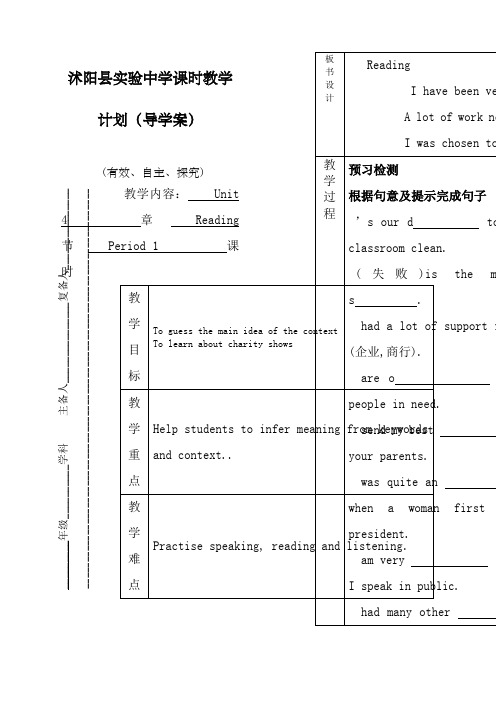
Step 4 Practice
Suppose one is Ricky, th
Simon. Simon wants to inte
about the show. Try t
interview between Ricky and
some information
巩固练习 根据中文意思完成下列句子
预
1. 不再有时间紧张了。 习
意见
a charity show?
10.Edison kept __________(try)
(2)If you are chosen
out new ideas.
host of the charity show
you feel?
(3)As a host, what wi
before the show?
节
Period 1
课
classroom clean.
时
( 失 败 )is the m
教
s
.
学 To guess the main idea of the context had a lot of support f
目 To learn about charity shows
(企业,商行).
标
are o
new words: introdu过ce; dfuitnyd; out : What’s the pas
business; camera; goo程ds 2. Reading task 2: After liste
4. Do some exercises (P63 B1),taapned, do “T” or “F” que
money with the help
- 1、下载文档前请自行甄别文档内容的完整性,平台不提供额外的编辑、内容补充、找答案等附加服务。
- 2、"仅部分预览"的文档,不可在线预览部分如存在完整性等问题,可反馈申请退款(可完整预览的文档不适用该条件!)。
- 3、如文档侵犯您的权益,请联系客服反馈,我们会尽快为您处理(人工客服工作时间:9:00-18:30)。
Unit 5 Good manners
ReadingⅠWhen in Rome
Pre-reading
1. Are the behaviors right or wrong in public?
drop litter leave the tap running keep quiet pick flowers
obey traffic rules queue for your turn touch someone push someone
2. Learn new words. touch push behave proper
3. Read the interview and choose main ideas this interview refers to(选择这篇采访涉及的).
While-reading
1.Greeting
Who they meet How they greet
[Further thinking]Do you know any other greetings?____________________________________
2. Start a conversation. (Line 8,9 )_____ can help to understand avoid.
3. In public.
(1) Read and judge (polite or rude?)
( )Queue for something ( )Push in before others
( )Push past people ( ) Shout or laugh loudly
( )Say "sorry” if they bump into others
(2)Read this part and use the verbs to finish the form below.
behave, queue, bump, push in, touch, wait, push past, shout, laugh, keep, say
________________ politely
In line
In the way
Voice
(3) Can you say something about manners in public? Retell according to the form above.
4. At home.
(1) Fill in blanks. British people say _________or ________________ all the time
(2) Discussion. Do we need to say “please” or “thank you” at home?
Post-reading
1. A game
How do you say when you meet an old friend in the street/ get help at home/ find somebody in the way/leave home for school/ask somebody to do something/meet somebody for the first time /bump into somebody? ___________________________________________________________________
_____________________________________________________________________________
(1)
(2)
(3)
(4)
ideas of the group and shares them in class.__________________________________________
__________________________________________________________________________________ Homework
1. Read the interview and tell your friends manners in the UK.
2. Search on the Internet to learn more about manners in different countries.
3. Read the following passage and learn more about manners in different countries.
Manners in different countries
You have to shake hands when you're coming or going in Germany, but in Britain you usually only shake hands when you meet someone for the first time.
You have to give your present in public in the Middle East to show it's not a bribe, but it's a good manner to give your present in private in Asia.
You mustn't give cutlery in Latin America because it suggests that you want to cut off the relationship. You mustn't give food or drink in Saudi Arabia because it suggests you think your hosts aren't offering you enough to eat and drink. You mustn't give a clock in China because the Chinese word fo r clock is similar to the word for funeral. “Come any time” means “I want you to visit me” in India. If you don't suggest a time and arrange a visit immediately, an Indian will think you are refusing the invitation. But if an English person says “come any time”, they will think you are bad mannered if you start fixing a date.
Offices are usually closed on Fridays in Moslem countries. Americans usually mean “Yes” when they nod their heads. An English person probably just means “I understand”, and an Asia n is just showing interest. It's a bad manner to discuss business at a social occasion in India.
In an English pub, you have to take your turn to buy a “round” drink for everyone in your group.
[Questions]1. In _______, you can give your presents in private.
2. When are the offices closed in Moslem countries?
3. Which manner do you think is most interesting?Could you share it with us?。
